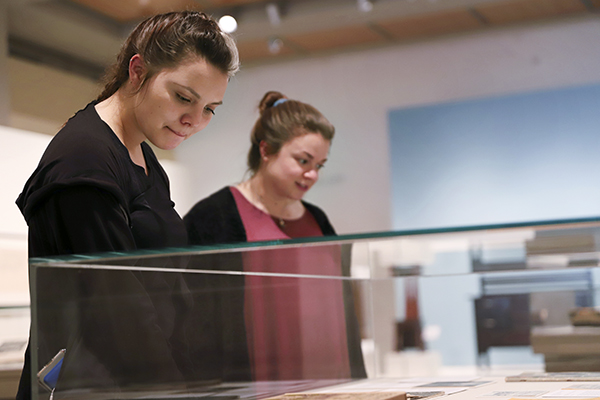At the intersection of 21st and Guadalupe streets, the Harry Ransom Center holds behind its imposing concrete walls an unparalleled collection of literary archives. Students and the general public can hold in their hands the drafts of the most pivotal novels, poems and plays.
For many undergraduates, knowing where to start at the center can be a daunting task. The Daily Texan compiled a list of five works of literature that students can access within the center’s collection.
“Infinite Jest” by David Foster Wallace
David Foster Wallace’s 1,100-page novel, written in the ‘90s, seems even more relevant now in its depiction of American culture. Wallace predicted new technologies like FaceTime and recognized the narcotic power of personal electronics. In the collection are some of the earliest drafts of the novel which features Wallace motivating himself with good job stickers and pep talks in the margins of spiral notebook pages.
“The Heart is a Lonely Hunter” by Carson McCullers
McCullers’ first and most esteemed novel centers on the outcasts of southern society, detailing the agony and heartbreak of various characters in a small town. Carson McCullers stands as a towering figure of Southern literature. Her novel follows John Singer, described as being deaf-mute and the circle of towns people that come to his house for comfort and refuge. Among Modern Library’s top 100 novels, McCullers’ novel places at number seventeen.
“Horseman, Pass By” by Larry McMurtry
The HRC possesses three drafts of McMurtry’s first novel, the tale of a cattle ranch after World War II when Texas began to undergo massive technological and cultural changes. The writer of “Lonesome Dove” began his career with an insightful look at the ugly collapse of the cowboy lifestyle. The protagonist, Lonnie, sees the ranching life that his grandfather raised him in collapse when the herd is struck with disease.
“White Noise” by Don DeLillo
A major influence on David Foster Wallace, Don DeLillo led literature’s depiction of the modern, technocentric life. From the grocery store to the home, DeLillo recognizes how entwined our lives have become with technology and machines. The title of the novel comes from what DeLillo calls the static hum produced by the numerous appliances within our homes coming together into one sound. DeLillo centers his novel on Hitler studies professor Jack Gladney, who cannot read German, and his family who are forced to flee their home after a chemical spill threatens their lives.
“A Streetcar Named Desire” by Tennessee Williams
Williams’ landmark play, further popularized by the Marlon Brando film, is considered one of the greatest plays of the 20th century. The play focuses on the isolated and alienated Blanche DuBois who represents the decay of the Southern belle as well as Southern culture more broadly. The playwright recognizes with sensitivity and passion the debilitating effects of loneliness in this play.





















